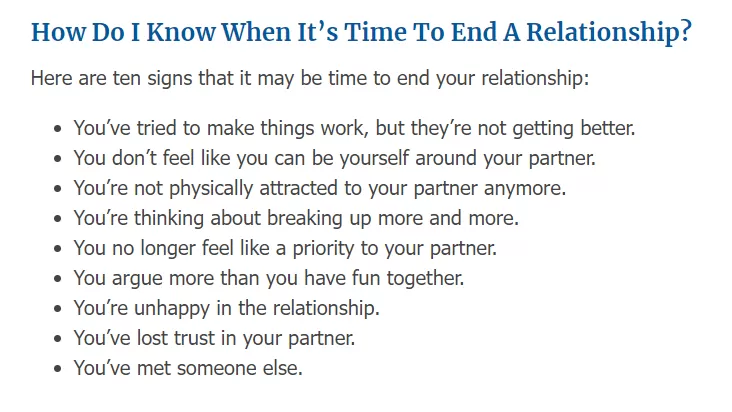Ending a relationship can be difficult, but you can minimize the pain for them. Learn how to break up without hurting your partner and leaving good memories.
Ending a relationship is never easy, but you can do so in a way that minimizes the pain for both of you.
This is a short guide with helpful tips on how to break up without hurting your partner.
Now, let’s dive into how to make the breakup process a little bit easier for your partner as well as you.
How To Break Up Without Hurting Your Partner
We suggest starting with being honest and direct, respectful, and showing patience for their emotional reactions.
Be Honest
Initiating a breakup conversation can be emotionally challenging, but maintaining honest communication is essential for a respectful and transparent discussion.
Provide genuine reasons for your decision, but avoid going into excessive detail, as it might cause more pain and confusion.
Maintain trust during the conversation by sharing your feelings without blame or shame.

Be Clear
To facilitate a smooth breakup, being clear in your intentions and reasons is crucial.
Take the time to prepare your thoughts before the conversation, practicing your speech to convey your message effectively and concisely.
This will help you avoid ambiguity and minimize misunderstandings. Furthermore, refrain from engaging in arguments during the discussion, as it can prolong the process and create tension.
Express Empathy
Acknowledging the emotions of both parties during the breakup is vital for a compassionate approach.
Showing empathy involves actively listening to your partner’s responses and allowing room for their emotions to be expressed.
This also shows you respect them, even during difficult circumstances.
Keep in mind that both the person initiating the breakup and the one receiving the news will likely experience a range of emotions, so remain sensitive to their feelings throughout the conversation.
How To Prepare For The Emotional Impact
Anticipate Grief
Breaking up with someone involves facing a range of negative emotions, and grief is one emotion that often surfaces.
As you prepare for the breakup, know that it is natural to feel a sense of mourning for the relationship, even if it was not a healthy one.
This grief may manifest through various stages, including denial, anger, bargaining, depression, and acceptance.
Recognize that these stages are normal and may fluctuate throughout the process. Give yourself and your partner the space to process and experience these emotions.
Ensure Closure
Achieving closure is an essential aspect of moving on from a relationship.
To provide an opportunity for closure, make sure you have a clear and honest conversation.
Acknowledge the love connection you once shared, and evaluate the reasons that led to the decision to break up.
Be compassionate and patient when discussing why the relationship has come to an end. This will help lay the foundation for healing and building a healthier future.
It is also crucial to give both parties a chance to express their thoughts and feelings openly, as this will create a space for compassion and understanding.
Make sure you listen patiently to your partner’s grievances. Avoid trying to justify or explain your actions excessively.
By giving them the space to process difficult emotions, you are more likely to leave them with a sense of closure.
So, for a smoother breakup experience, absorb their emotional impact, give them closure, and address them in a respectful way.
Leave with a wish and prayer for their healing and growth.
How To Deal With Their Reactions and Responses
Handling Distress
When breaking up with your partner, you have to prepare for their emotional fallouts and distressful reactions.
Acknowledge and validate your partner’s feelings.
Show empathy and understanding of their emotional state, whether they are sobbing, breaking down, going silent, being reactive, or showing some other response.
Keep in mind that it’s natural for both of you to feel a range of emotions, from sadness to anger. If the distress becomes overwhelming, consider taking a short break to allow each person to process their emotions.
Try these methods when dealing with distress:
- Allow for open communication and active listening
- Maintain composure and remain calm
- Offer reassurance and support
Navigating Questions
As the conversation unfolds, be prepared for inquisitive reactions and questions related to the breakup.
Approach their inquiries with honesty, clarity, and consideration. Refrain from placing blame or being overly critical during this sensitive discussion.
If a question is too challenging or uncomfortable, gently request more time to reflect on the issue.
The following guidelines can aid in addressing questions:
- Encourage an open, non-confrontational conversation
- Balance statements with tact and genuine feelings
- Offer constructive criticism when appropriate
- Be truthful without resorting to negativity
Throughout this process, remember that emotional healing takes time. Encourage your partner to prioritize self-care and obtain support from friends, family, or therapy.
Breaking up can be a tumultuous experience, but managing reactions and responses with kindness and understanding will facilitate a smoother transition for both parties.
How To Set Boundaries and Respect Personal Space
Physical Boundaries
When ending a relationship, it’s essential to establish clear physical boundaries. This means being upfront about the need for personal space and respecting each other’s choices.
Whether it’s deciding not to share the same friend group or avoiding places where the other person might be present, establish healthy boundaries to allow both parties the opportunity to heal and move forward separately.
Involving friends and family as a support system can help maintain the newly set boundaries.
Emotional Boundaries
Similarly, emotional boundaries are vital for maintaining well-being and self-respect during and after a breakup.
Emotional boundaries foster worry-free, open communication, and allow expressing one’s feelings and expectations without the fear of judgment or backlash.
For instance, both parties should agree to refrain from discussing sensitive topics or revisiting painful memories.
Moreover, respecting their emotional boundaries means giving each other the required amount of space and time to cope with their emotions.
Seeking support from loved ones or professionals can be a helpful step in navigating through complex feelings and setting healthy boundaries.
Remember to maintain a balance between setting these boundaries and respecting the other person’s needs.
Offer clear instructions on how you may be available to help them navigate the breakup, so that they do not over-expect from you or you do not remain overwhelmed with their requests.
How To Recognize Signs To End the Relationship

Lack of Trust and Support
One crucial element of every healthy relationship is trust.
If both partners cannot trust each other, the relationship’s foundation becomes shaky.
Unresolved trust issues typically lead to arguments and misunderstandings, which might indicate a need to reconsider the relationship. Some signs of a lack of trust include:
- Constantly questioning the partner’s honesty.
- Feeling insecure about the relationship’s future.
- Keeping secrets or concealing information.
A stable and healthy relationship needs trust and support from both. If there is a lack of mutual support and trust, it could lead to feelings of isolation or disconnection.
Signs that support may be lacking are:
- Disregarding the partner’s needs and emotions.
- Limited or lacking emotional connection.
- Neglecting the partner during challenging times.
Infidelity
Cheating is unequivocally a major reason to end relationships, having destroyed many of them due to broken trust and irreparable emotional damage.
Infidelity can have various forms, such as emotional or physical cheating, and can be a deciding factor for many individuals looking for reasons to break up. Some signs a partner might be being unfaithful include:
- A sudden change in habits or appearance.
- Acting more secretive or defensive.
- Exhibiting decreased communication and emotional intimacy.
Remember that while recognizing these signs can be helpful, engaging in open communication with your partner before drawing any conclusions is essential.
By addressing the issues as they arise, both partners have an opportunity to resolve them or decide if they need to go their separate ways.
You can rebuild after cheating.
Seeking Guidance from Professionals
Therapists and Counselors
When facing a difficult breakup, seeking guidance from professionals like therapists and counselors can be extremely helpful. These experts provide a support system and assist individuals in processing emotions, fostering healthy communication, and promoting personal growth.
Therapists use various techniques to aid their clients, such as:
- Active listening: Ensuring clients feel heard and supported
- Problem-solving: Guiding clients to identify and develop strategies to approach their issues
- Goal-setting: Establishing realistic plans to achieve desired outcomes
Psychotherapists
Another valuable resource during a breakup is a psychotherapist. These professionals differ slightly from traditional therapists and counselors, as they specialize in mental health and psychological disorders. If a breakup triggered intense emotions, a psychotherapist might offer additional support and coping tools.
Psychotherapists may employ techniques like:
- Cognitive-behavioral therapy: Identifying and changing negative thought patterns
- Mindfulness practices: Encouraging clients to stay present and focused on their emotions
Learning from the Experience
Valuing Self-growth
Breaking up can be a difficult and emotionally draining experience, but it can also stimulate self-growth.
Embrace the opportunity to learn from the past relationship by reflecting on the positive memories and shared values.
This period of introspection can lead to a deeper understanding of one’s personal needs, boundaries, and goals in future relationships.
Consider mindful journaling or engaging in mindfulness activities to facilitate growth and clarity.
Maintaining Self-esteem
When dealing with a breakup, it is crucial that you pay attention to your self-esteem.
Despite the emotional turmoil, remember that self-worth is not defined by a single relationship or its outcome.
Focus on the effort and personal growth achieved throughout the relationship, and recognize the qualities that make you a valuable partner.
Surround yourself with a supportive network of friends and family who can help reinforce your self-esteem and encourage your emotional well-being.
Try to maintain a balance between reflection and action.
Here are some suggestions for healing and moving forward after a breakup:
- Engage in activities that boost your self-esteem and self-worth
- Limit contact with your ex to promote a healthy detachment process
- Seek therapy or counseling to gain additional support and guidance
- Reflect on the lessons learned from the relationship to prevent repeating past mistakes
Final Words
By keeping these tips in mind and focusing on self-growth and self-esteem, you can harness the power of a breakup as a transformative experience for yourself.
And make it non-hurting for your partner to accept the breakup, move on in life, and stay open to healthy and fulfilling relationships in the future.
Finally, it can be hard to figure out how to move forward when a relationship ends, but you can learn to use the power of silence to heal after breakups.
• • •
Author Bio: Researched and reviewed by Dr. Sandip Roy. His expertise is in mental well-being, positive psychology, narcissism, and Stoic philosophy.
√ If you liked it, please spread the word.